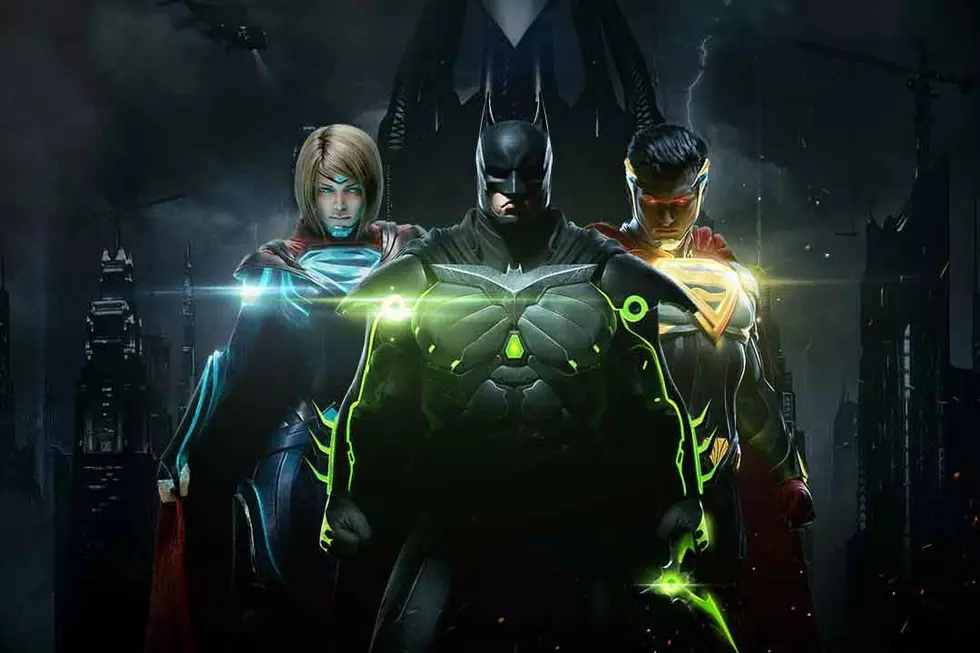
Heroes For Her: Why We Need ‘Supergirl’ and ‘Jessica Jones’, And What We Can Learn From Both
Two new superheroine shows debuted this fall; CBS’ Supergirl and Netflix’s Jessica Jones. Jessica Jones received acclaim from critics and viewers alike, while Supergirl has already received a full season order for its first season. Both shows have wildly different themes, different tones, different distribution channels, and different core demographics… and yet within a few days of Jessica Jones' release, opinions popped up about how the dark, gritty Jessica Jones is a sign that bright, optimistic Supergirl will fail, or that the arrival of Jessica Jones means that Supergirl is irrelevant and unnecessary.
I anticipated on the Friday that Jessica Jones came out that some people would have this response, and it only took until Monday to prove me right. Yet there's no reason to pit these shows against each other. This “either/or” mentality is a horrible idea.
While there is certainly overlap for the Jessica Jones/Supergirl audiences (case in point: me), they really are very different shows. Supergirl is clearly written to be appropriate for young kids to watch with their families, just like The Flash. It’s a different audience, a different tone, and a different kind of story. But even if the dark and violent Batwoman was on TV alongside Jessica Jones, or a bright, relatable heroine like Ms. Marvel alongside Supergirl, it would be terrible to suggest only one deserves to exist.
Female characters aren’t the Highlander. Women's experiences are vast and varied and deserve to be told in lots of different stories. Frankly (and this is important), there are plenty of heroines of color and queer heroines and, oh yeah, queer heroines of color whose stories I absolutely want to see beyond the pages of the comics, and I’d rather spend my energy calling for those characters to join the ranks of Kara and Jessica (and Peggy Carter, for that matter) than be sucked into a debate over which one is really "worthy” of a show.
So let’s not talk about what one show has over the other, or why one show will “make” the other one fail. Instead let's talk about something the shows do have in common --- an ability to connect with female audiences --- and how that can provide a template for more successful superheroine shows.
(Note that this article contains spoilers for the first six episodes of Supergirl and the first full season of Jessica Jones.)
A Cast Full of Women
Too many stories built around a female hero fall into the trap of making her the only major female character in the cast --- Agent Carter is a perfect example. Often those women are really cool characters, but the stories they’re in (whether in TV shows, comics, novels, or movies) perpetuate the idea that men are the default setting, and there’s only room for one leading woman in a man’s world. This feeds the idea that women must always compete with each other to get the spotlight.
Jessica Jones and Supergirl both avoid that idea simply by having lots of roles for women. In Supergirl, we see Alex and Cat Grant in Kara’s daily life from the very first episode, but as the series develops we also get glimpses of the relationship between Kara and her foster mom; memories of her mom on Krypton; and a budding, albeit slightly awkward, friendship with Lucy Lane. And all that doesn’t even include her battle with Livewire and ongoing struggle with evil space aunt Astra.
Jessica Jones has Trish, Hope, lawyer Jeri Hogarth, neighbor Robyn, Jeri's current and former lovers Pam and Wendy, Trish’s terrible mom, Hope’s mom, Kilgrave’s mom, and a plethora of smaller roles that were cast as women. As a final cherry on top, we got to see Daredevil’s Claire Temple (played by the ever wonderful Rosario Dawson) come to Jessica’s aid in the season finale and stick around for pretty much the entire episode to interact with Jessica, Luke, and Malcolm.
It’s still rare to see shows with this many female characters both in the forefront and background. It’s not just that these shows refuse to let their heroines be the smurfette of their universes, but also that the dynamics between the different women become key components of the shows themselves.
The Sisters
Speaking of character dynamics, at the core of Supergirl and Jessica Jones are the relationships the protagonist have with their respective adopted sisters — Alex Danvers for Kara, and Trish Walker for Jessica. Jessica and Kara have love interests in Luke and Jimmy (two characters I think are awesome in their own right), but Trish and Alex are the core, resilient relationships that our heroines depend on.
Interestingly enough, Alex Danvers is a brand new character created for Supergirl, and Trish, while a long-time comic icon as Patsy Walker from the vintage teen romance comics, was adapted into the story to partially replace Carol Danvers’ role in Alias (since Carol’s MCU introduction is being held off for the films). It feels very deliberate on the writers’ parts that they wrote in previously not-in-canon relationships between the heroines and other female characters that are based in unconditional love and support --- even when the heroine is doing something that the other character thinks is a horrible idea.
These are relationships earned over time. As teenagers, Alex and Trish are frustrated by the 'new sister' situation at first (as we learn in the Supergirl pilot and down the line in flashbacks on Jessica Jones), but through Kara’s sense of adventure and Jessica’s stubborn defensiveness of Trish, the sisters grow close. By the time we meet the characters as adults, Alex and Trish are so protective of their superpowered loved ones that they've both taken on combat training in secret in order to fight against the forces Kara and Jess are facing.
Likewise, our heroines would do anything to keep their very human sisters safe — it’s so fitting that saving Alex’s plane is Kara’s first act as Supergirl, and telling Trish she loves her is the last thing Jessica does before killing Kilgrave.
Successful Older Women as the Boss
The TV versions of Cat Grant and Jeri Hogarth have pretty specific surface comparisons. They’re both women in positions of power, they both employ the show’s protagonist, they're both comfortable taking the protagonist down a peg, and they’re both played by actresses older than 45. In most other shows, their roles would be played by men. That we have two superhero shows on at the same time that chose to include successful older female characters in the main cast is pretty huge.
The biggest thing for me is that both women are blunt and direct in their discussions with Kara and Jessica. They tell it like they see it, refusing to put on fake optimism just because it’s expected of their gender.
Jeri might be punished at the end of the season for certain selfish choices (and what it says about the MCU’s extremely lacking LGBTQA+ representation is another story), but I never felt the show was punishing her for being a tough woman. And Cat Grant may be warming up to Supergirl and Kara as we get deeper into the season (especially after Cat realized how meeting Supergirl has inspired her son Carter), but that doesn’t mean she’s any less cutthroat in her business choices or tough in her comments.
The shows walk a fine line to show these older women as flawed, but not demonize them specifically for being older women, which is a relief.
Heroines Allowed to Feel
There’s this terrible trope used far too often by people (let’s be honest, often men) writing women where a heroine shows no emotional vulnerability whatsoever. Because, you see, if she is a “strong female character” and strong is the opposite of weak, she must be strong and impervious to weak feminine things like emotions, right? Well, wrong.
Well-written heroines do have emotions (because surprise, well-written characters have emotions), and one of the things I like most about these two shows is that their heroines express whole ranges of emotions, even though the shows’ tones are vastly different.
Jessica might give off a blasé attitude, but she is extremely vulnerable through a good portion of the season. She’s struggling with her valid fear of Kilgrave, with the anxiety that comes from her PTSD, and from the depression and self-loathing she feels at her recent actions, along with what she sees as her part in her parents’ and brother’s deaths. Krysten Ritter’s performance works wonders, and we’re able to see a tough-as-nails survivor who is still trying to deal with it all as best as she can.
Kara is also the only survivor in her immediate family, and while she struggles with confidence at times, the real moments of sadness come when she’s reminded of her mother, both in holograms and in the face of her sinister aunt. There’s a lot of hurt underneath the surface for the character, and I love the nuance in Melissa Benoist’s performance when Kara continues to deal with that loss in the present — the moment Kara’s voices cracks during the “I’d ask a hug” line at the end of the second episode took what could have been an overly sentimental line and made it feel authentic.
So often, female characters are the patient, supportive, forgiving ones at the expense of their own feelings, which is why I’m most pleased that, along with anxiety, frustration, and sadness, both heroines are allowed to show anger. Granted, 'mildly pissed off' is one of Jessica’s go-to expressions, but we also get to see her absolutely livid, particularly at Kilgrave during their 'truce' of sorts. She is angry, and with everything we know about Kilgrave and what Jessica went through, she is justified in her anger. In those moments, Jessica has so many defenses down, yet still gains strength by expressing her anger out loud and validating her own feelings.
On the other side is Kara, who until the latest episode has only shown a little anger, but it mostly brewed under the surface, expressed as frustration towards those who didn’t trust her or take her seriously. Episode six was all about Kara being angry. Really, really angry. Angry at General Lane’s actions; angry at Jimmy and Lucy’s relationship; angry at Lucy’s dislike of Supergirl while being friendly towards Kara; angry at the public for switching opinions on her so quickly; and angry at Cat for taking out her own anger on Kara. And it’s actually Cat who empathizes with her, and tells her that getting angry about the world they live in (especially as women in a sexist industry) is going to happen. And that’s kind of incredible. The show certainly has a “lesson of the week” feel to it, but how often is, “You should get angry” a message girls get to hear?
Both Jessica Jones and Supergirl have flaws. A completely valid criticism of both is that these are thin, white (and presumably straight, although it’s never implicitly said) heroines with a few women of color in the background at best. Having only white women be the focus and the main heroes is as much a problem as suggesting or implying that only gritty, uber-violent heroine stories deserve to be told.
My hope is that the showrunners and movie producers coming up with more superheroine media will take the great things Supergirl and Jessica Jones share and put them towards creating a more diverse line-up of superheroines. With more stories of more different types of women as heroes on our screens, that’s how we all win.
More From ComicsAlliance









